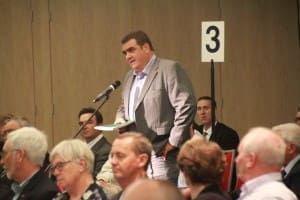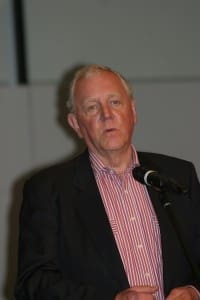It slipped by without fanfare, but a piece of history was made at yesterday’s Meat & Livestock Australia annual general meeting in Sydney.
In what is believed to be a first in the 16 year history of MLA AGMs, an election was held that involved a contest between two candidates for a single position.
Cattle producer members had the opportunity to vote on two candidates to fill one available position for a grassfed cattle producer representative on the MLA Board Selection committee.
Central Queensland cattle producer Ian McCamley was re-elected to his second term on the board selection committee with 1,608,439 votes, ahead of South Australian candidate Tim Burvill with 850,903 votes.
It was a small but defining moment that was indicative of the changes occuring in response to growing calls for greater producer control and improved democratic processes at industry level.
The board selection committee’s role is to assess all candidates for available MLA board positions and then to choose one candidate for each available board position to go before a vote of MLA members at the next AGM.
Effectively MLA members are only given the opportunity to endorse or reject the candidate put forward for each position, and are not given a chance to vote on a choice of candidates for each position. This is despite the fact that more than 100 candidates typically nominate for the two to three board positions that come up for election each year.
At yesterday’s AGM, for example, three board positions were available and only three candidates were presented to members for their approval, as per MLA’s consitution.
The nominations of the three candidates – re-standing board member Geoff Maynard and new board candidates Allan Beckett and Chris Mirams – were passed by the vote of MLA members.
Uncontested elections were also held to fill vacant positions on the MLA Board Selection Committee with Therese Herbert from NSW elected as the lot feeder representative on the committee and Jane Kellock from SA elected as the sheep representative. (See separate story on the full MLA AGM voting results).
MLA managing director Michelle Allan told yesterday’s AGM that the board was responding to concerns expressed by producers during the recent Senate Inquiry process that MLA members should be given greater choice on board candidates at each AGM.
Those concerns were given voice at yesterday’s AGM by WA producer David Slade in a question to the chair, Dr Allan.
“I find it hard to believe you couldn’t find any more candidates than one to sit for each position for the board,” Mr Slade said.
“Why couldn’t we have half a dozen candidates out of 100? Effectively your rigging of the vote allows us not to have a choice.”
Dr Allan said the Board and peak industry councils were already working together to find a solution.
“As the constitution is currently written, the selection committee chooses the candidate that is most appropriate for the job out of all the candidates that they interview and they present those candidates to the AGM,” she explained.
“So we are looking at this, we are looking at further constitutional change around the number of members that are put up for election around the AGM as highlighted in the senate inquiry.
“We didn’t have enough time to actually work that through that this year with our peak industry councils but that is something the MLA board only discussed yesterday and we’re looking at thinking through the changes to the constitution that would allow you to have more than one member to vote on.”
Two significant resolutions were also passed at yesterday’s AGM to increase the number of grassfed cattle producer representatives on the MLA Board Selection Committee from one to two, reflecting that sector’s dominant share of levy contributions to MLA, and to reduce the number of MLA board members on the selection committee from three to two.
While the third MLA board member will drop off the selection committee immediately, Beef Central understands that the second grassfed producer representative on the board selection committee will be appointed via a vote of MLA’s cattle producer members at the next AGM in 12 months time.
Yesterday’s AGM was held against a backdrop of ongoing uncertainty around future industry structures, as the broader red meat sector waits to see how agriculture minister Barnaby Joyce will respond to the sweeping recommendations made recently by a Senate Inquiry for grassfed industry reform.
In September Senators recommended that grassfed levy revenue should flow directly to a grassfed producer owned, elected and controlled body instead of to MLA.
While the scope of the inquiry was limited to the grassfed sector alone, if implemented, its main recommendation will have far-reaching ramifications for all red meat sectors, not just grassfed beef production.
Removing grassfed levies from MLA would heavily impact on its current resourcing and in turn on the work it does for the grainfed cattle, sheep and goatmeat industries which also fund it, and the joint programs currently underway with the processing and live exporting sectors.
Beef Central believes the Cattle Council of Australia and the Australian Beef Association held private talks while in Sydney for the industry AGMs this week with the aim of developing a united proposal for a producer body to control the grassfed levies in future to take to the broader industry and Government.
While the various grassfed producer groups have moved broadly onto the same page in the wake of the Senate’s recommendation that grassfed producers control the grassfed levies, the sweeping changes involved will generate resistance from other impacted sectors.
For and against: What they said
Two prominent cattle industry stakeholders spoke for and against the two resolutions to amend the MLA constitution at yesterday’s AGM.
The resolutions were to reduce the number of MLA Directors on the MLA Board Selection Committee from three to two, and remove their voting rights and enable the Committee to elect its own Chair; and increase the number of cattle representatives on the MLA Board Selection Committee from one to two.
Speaking against the motion was Australian Agriculture Company managing director Jason Strong:
“Given all the activities that are going on around industry structures and reviews at the moment, if these are the two biggest things that we can come up with to changing the constitution, then we’re really not thinking about it the right way.
“But secondly those changes and the things that are proposed are going to have quite significant impacts on the organisations that are involved in these sorts of discussions, on MLA and on us as producers, and I think that making these sorts of changes around governance and structure at this stage is pre-emptive and inappropriate.
“The third one being around the stability of the board.
“I think we have much bigger challenges around the stability of the board that represents MLA when you look at a 12 member board where we now, and have had for some time, only two people with more than five years of experience with a reasonably complex business and set of information to get across, we have a significant challenge as far as corporate knowledge and stability is concerned.
“And I think that making changes around the structure of the board and the way it is selected, is not something we should be doing.
“So I think that given the current environment, the changes being proposed more broadly across the industry and potentially impacting on MLA, and the fact that we need to have a broad review of how we select the board representatives for our company, I think we should park both of these resolutions for the moment.”
Speaking in favour of the motion was Victorian cattle producer and former CCA president John Wyld:
“I rise with some trepidation to speak against my good friend Jason, but nevertheless this resolution is long overdue.
“It was originally designed to be carried after the first three years of the MLA structure.
“The reason there is three directors on the selection committee was to provide stability during the initial phases of the MLA board when there were not very many members and it took time to establish itself.
“The resolution has been put up again since at least one time and it is really designed to probably overcome some of the issues Jason referred to.
“I think we’re all aware that there as been some churn of the MLA board. I don’t know why that is particularly, but I do think that having three board members sitting in judgement over their fellow directors some times makes it a very awkward situation.
“Clearly there needs to be input from the current board by way the chairman, because you do need some confidential information about how the board is performing, the sort of skills you need, te people who are really kicking goals, some maybe not, so you need that input, but I think the board should be selected from a broader range rather than just being restricted or dominated by board members, so I would speak strongly in favour of carrying this long overdue resolution.”
UPDATE: In a note to Beef Central yesterday following publication of this article, MLA board member Lucinda Corrigan advised of one other contested election held very early in MLA’s life. In 1999, the year after MLA commenced, she stood against seven candidates for the position of grassfed producer representative on the MLA Board Selection Committee and was elected with 54pc of the vote. It was initially a one year term and the constitution was changed the following year to make it a three year term.



